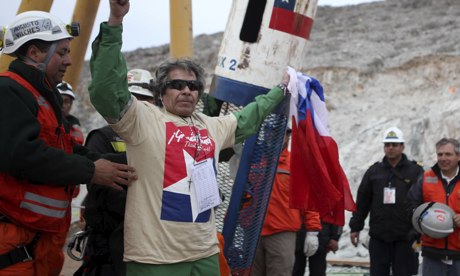
When 33 Chilean miners were hauled to the surface after 69 days trapped in a collapsed copper mine in 2010, more than a billion people around the world tuned in to watch as the rescue was broadcast live on television.
It was inevitable, then, that the dramatic story would be made into a movie. But just weeks before filming is set to begin for a multimillion dollar Hollywood film starring Antonio Banderas and Martin Sheen, the miners are locked in a bitter legal dispute over the contract in which they signed away their life rights.
Several of the men, including Luis Urzúa, who was foreman of the group at the time of the mine collapse, claim they were tricked out of royalties by lawyers and abandoned by the Chilean justice system.
"We have to fix our affairs with the lawyers and with the [movie] producer that is in the United States. With the march of time, we have had various complications with respect to our life story," said Urzúa,. "I don't think we are going to make a movie and then later realise we feel bad [because] our rights were infringed."
Over the past months the miners have divided into two factions. One – led by Urzúa – has complained that they were pressured into signing the contracts, which were available only in English. The other group said the contracts were also drawn up in Spanish and were the result of a group vote.
Urzúa, who is president of the miners' group, "The 33 of Atacama", said the men did not oppose the making of the movie, but said: "We are against what happened with our contracts, how they were developed and how they are at this point.
Mario Sepúlveda, who acted as the miners' spokesmen in videos recorded underground, has also protested against the contracts. He is to be played by Banderas in the movie, but when the Spanish star visited Chile last month Sepúlveda refused to meet him because of the legal battle.
"There will be no meeting with Banderas until the contract conditions are fixed and conversations had with the lawyers," said Elvira Valdivia, Sepúlveda's manager and wife. "It is the only way to pressure so that the situation can be resolved," she told Chilean newspaper La Tercera.
The legal fray is focused in part on who retains the long-term rights to key elements of the rescue, including a private diary kept by the miners, and still unknown details about the initial 17 days of the entrapment. It was during those first 17 days the miners were trapped with practically no food that the 33 men created a remarkable underground community that included daily votes on key issues, 12-hour work shifts, a system of underground lighting, morning prayer meetings and a daily ration consisting of a single spoonful of tuna fish and a sip of rancid milk. Their democratic and communal decision-making during this crucial period was later cited by Nasa specialists as instrumental to their survival.
Some of the miners want to revisit the initial contracts, signed in December 2010. These miners, led by ex-shift leader Urzúa, are willing to cede rights to make the movie, from which they will each receive a portion of the revenue. However, these miners claim the legal contracts they signed with Carey, a leading Chilean law firm, and a group of Chilean investors stripped them of other long-term rights and the corresponding revenue from the sale or commercialisation of key portions of their entrapment.
Disagreement among the miners and the legal battles over the contracts continued for months until lawyers from Carey severed its representation in a letter sent to the miners last month. "We will not be making any public statements," said Magdalena Engel of the law firm.
Despite the miners' misgivings over the legal agreements, shooting is set to begin this month in Colombia, where the underground sequences – including the cave in which the men were trapped – are to be filmed inside a disused mine. Other scenes are to be shot in Chile.
The film, directed by Mexican-American Patricia Riggen, will be filmed in English. Jennifer Lopez dropped out of the project this year, citing conflicts with her schedule as a judge on TV show American Idol.
The controversy over the miners' life rights is just the latest in a series of battles the men have faced since their rescue. Many still complain of nightmares, flashbacks and a host of psychological traumas, and few have been able to secure steady employment. Given the exaggerated promises of riches that followed their rescue, the men cling to the movie as their last chance to bring in a bit of money to add to their fame.
The miners' bitterness is augmented by the Chilean government's decision to close a criminal investigation against the owners of the San José mine. In August, state prosecutor Héctor Mella announced the government investigation had not gathered sufficient evidence to present charges and would be shut down.
Sepúlveda and other miners also protested against the government-sponsored third anniversary of the rescue held last month. When the Chilean president, Sebastián Piñera, travelled to the northern desert city of Copiapó to commemorate the incident, only 13 of the 33 miners attended the ceremony. Several miners used the occasion to complain that the government had not followed up on promises to take care of the miners' health and welfare.
"I don't have anything to celebrate yet," said Sepúlveda, one of the 20 miners who declined to attend the ceremony. In an interview with Radio BioBio, Sepúlveda said he would celebrate "if we had some good news, but the truth is we have not. The justice [system] in this country is worthless. Second, things have not gone well with the movie or the book, the only thing they have done is help third parties profit."

